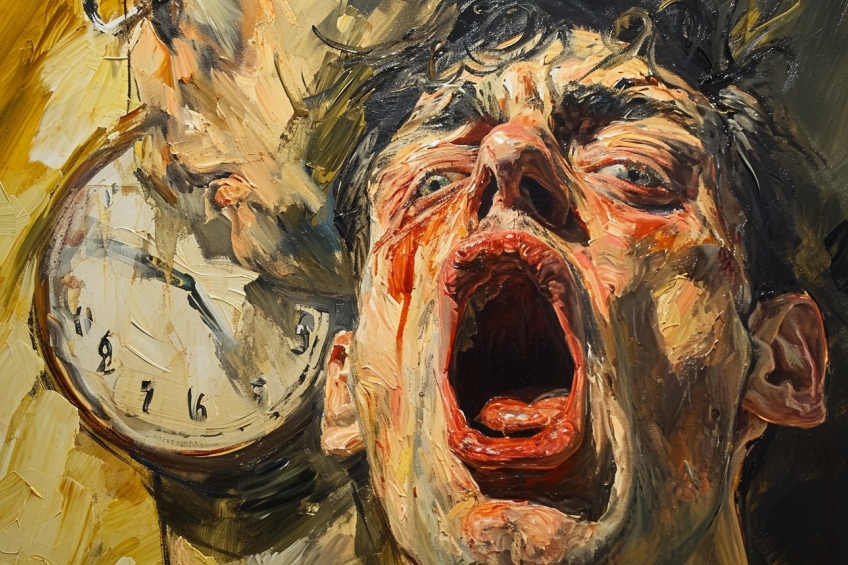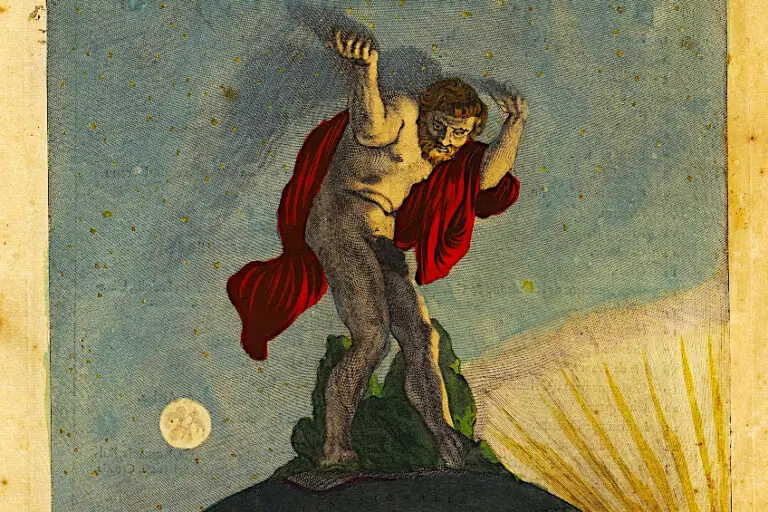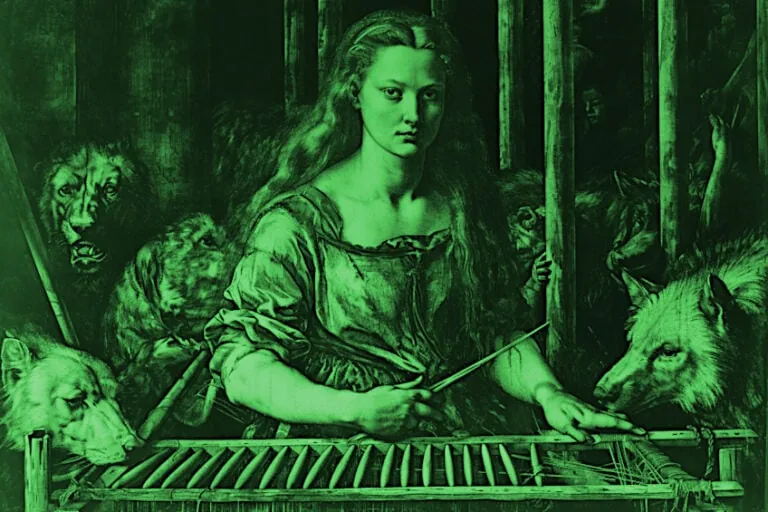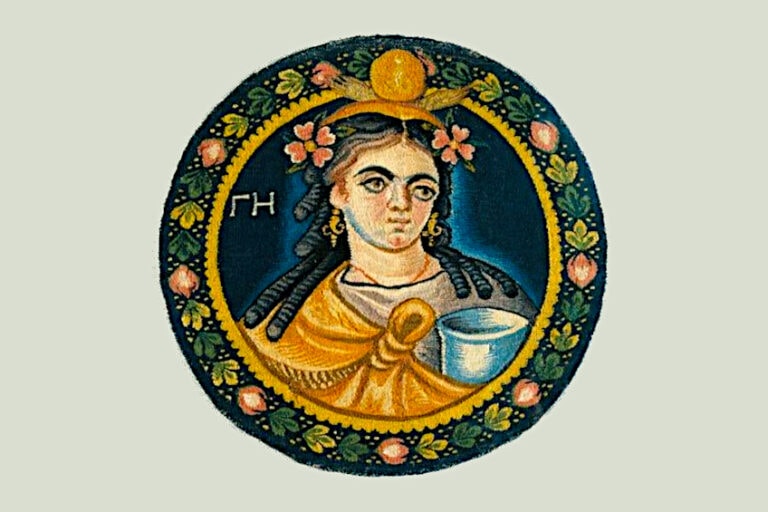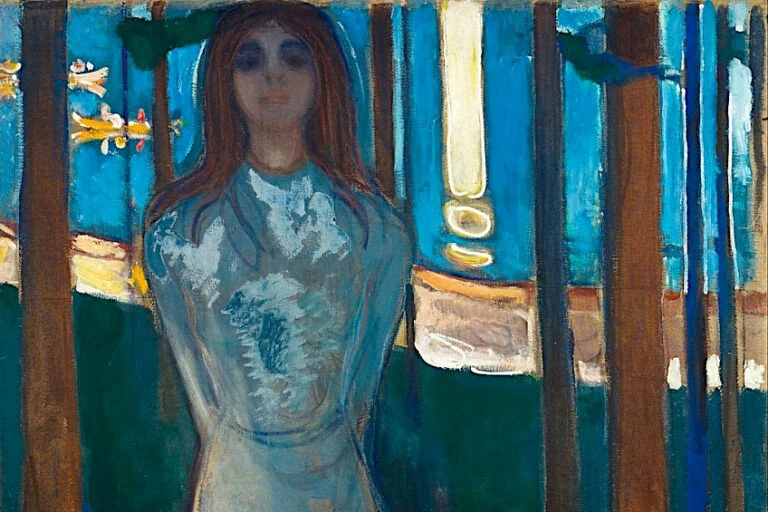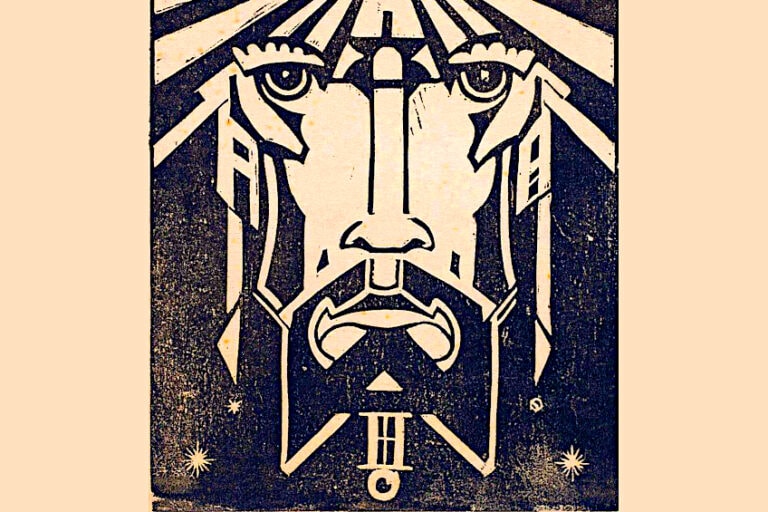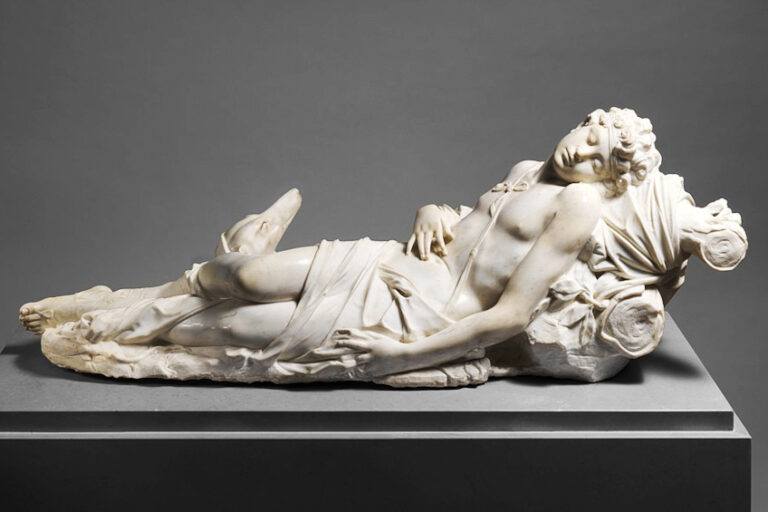Greek God Cronus – The Golden Age King Who Ate His Offspring
What is Cronus the god of, and why did Cronus eat his children? The Greek god Cronus was king of the Titans and served as the god of the harvests. He was also the god of time who overthrew and castrated his father, and devoured his own offspring. Below, we shall find out more about the Greek god Cronus, and answer various questions regarding his mythology, such as “who is Cronus’ father?”.
Contents
The Greek God Cronus
| Name | Cronus |
| Gender | Male |
| Symbols | Grain, sickle, and scythe |
| Personality | Determined, rebellious, and paranoid |
| Domains | Tartarus |
| Parents | Gaia and Uranus |
| Spouse | Rhea |
| Children | Hestia, Demeter, Hera, Hades, Poseidon, Zeus, Chiron, Hephaestus, and Aphrodite |
Cronus was an important figure in the formation of the known cosmos, initially as a rebel against Uranus and later as the dictator against whom Zeus launched his uprising. The Greek god Cronus was the youngest son of the primordial gods Gaia and Uranus, the head of the first generation of the Titan gods, and the ruler of all things a brief time. Let’s find out more about this famous Titan’s background and family below.
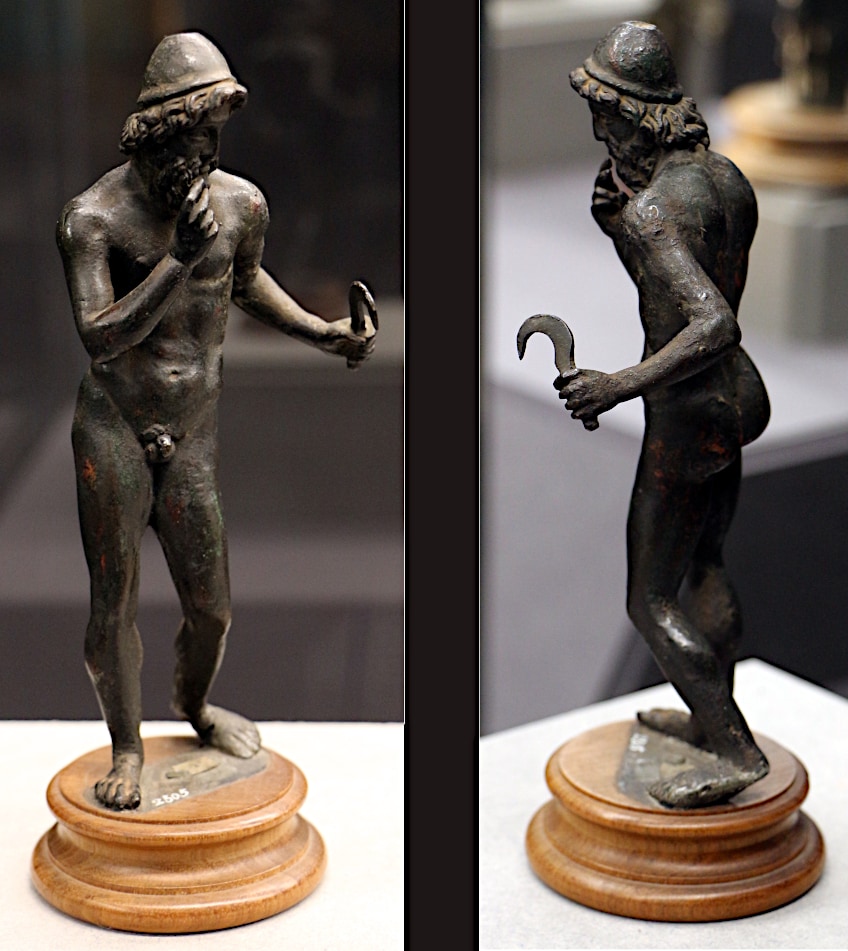 Front and rear view of a Roman statuette of Saturn/Cronus holding a sickle; Sailko, CC BY 3.0, via Wikimedia Commons and Sailko, CC BY 3.0, via Wikimedia Commons
Front and rear view of a Roman statuette of Saturn/Cronus holding a sickle; Sailko, CC BY 3.0, via Wikimedia Commons and Sailko, CC BY 3.0, via Wikimedia Commons
The Greek God Cronus’ Family and Background
Who is Cronus’ father and mother? Cronus was the child of the embodiment of the Earth itself, Gaia, and the personification of the Sky, Uranus.
He is a significant figure in the ancient Greek Succession Myth due to his role in overthrowing Uranus and subsequently being overthrown by his own children in return. Let us start this chapter with the story of how the Greek god Cronus came to power.
Cronus’ Ascension to Power
Uranus had also enraged Cronus’ mother, Gaia, by forcing their children back into the Earth as soon as she gave birth to them. Gaia fashioned a massive stone sickle and assembled Cronus and his siblings in order to urge them to castrate the almighty Uranus. Only Cronus volunteered to take on the task, so Gaia handed him the sickle and set him up in an ambush. Cronus struck Uranus with the sickle when he came down to lie with Gaia, castrating him and tossing his genitals into the sea.
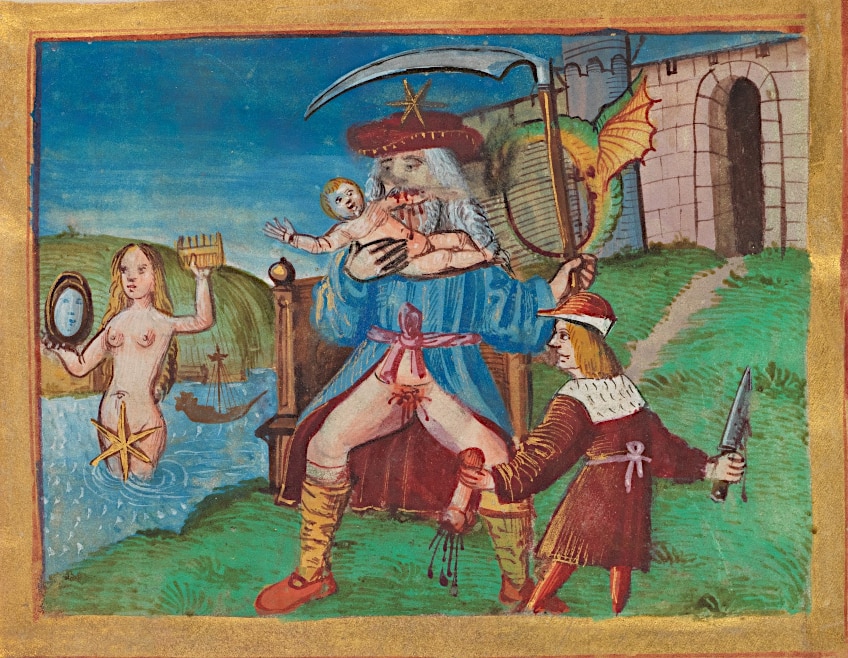 Illuminated manuscript depicting the castration of Uranus by Cronus and the birth of Aphrodite (c. 1501). Uranus is identified as Saturn (Cronus) and is depicted devouring his son, conflating two different episodes in the Succession Myth; AnonymousUnknown author, Public domain, via Wikimedia Commons
Illuminated manuscript depicting the castration of Uranus by Cronus and the birth of Aphrodite (c. 1501). Uranus is identified as Saturn (Cronus) and is depicted devouring his son, conflating two different episodes in the Succession Myth; AnonymousUnknown author, Public domain, via Wikimedia Commons
The Gigantes, Meliae, and Erinyes were created from Uranus’s blood that poured forth and dropped to Earth. The testicles discharged a white froth from which Aphrodite arose. Uranus promised revenge and referred to his sons as Titenes for crossing their bounds and daring to carry out such an atrocity.
Cronus then threw his sickle into the sea, where it remained hidden beneath the island of Corfu.
While Hesiod seems to infer that Cronus never let them escape in the first place, Pseudo-Apollodorus claims that once Uranus was taken care of, Cronus re-imprisoned the Cyclopes and Hecatoncheires and assigned the dragon Campe to guard them. He and Rhea, his sister, were crowned king and queen of the world. Cronus’ reign was known as the Golden Age because the citizens of that period had no need for laws; everybody did what was the good and right thing to do, and immoral behavior was non-existent.
Cronus and His Children
Cronus heard from Gaia that he would be defeated by his own offspring, just as he had defeated his own father before. As a result, despite having spawned the gods Hestia, Demeter, Hades, Hera, and Poseidon through Rhea, he consumed them all immediately as they were born in order to prevent the prophecy from being fulfilled.
When Rhea’s sixth offspring, Zeus, was born, she asked for Gaia’s help in devising a plot to save them and finally exact vengeance on Cronus for his actions against Uranus and his offspring.
In Crete, Rhea discreetly gave birth to Zeus and presented Cronus with a stone wrapped in swaddling blankets. Cronus swallowed the stone whole, believing it to be his son. According to some sources, Rhea pretended to suckle the stone before presenting it to Cronus, and the Milky Way galaxy was formed when her breast rubbing against the stone spewed milk across the skies.
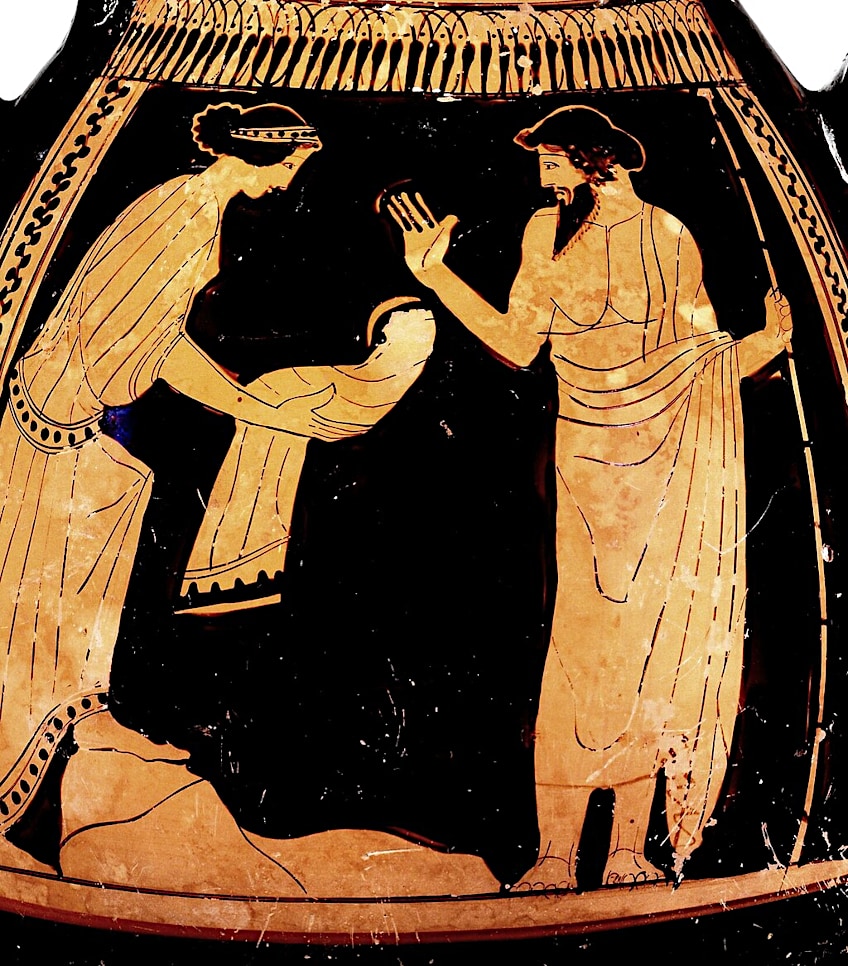 Red-figure pelike with a depiction of Rhea handing Cronus a rock disguised as the infant Zeus (c. 460-450 BCE); attribuito al it:Pittore di Nausicaa, Public domain, via Wikimedia Commons
Red-figure pelike with a depiction of Rhea handing Cronus a rock disguised as the infant Zeus (c. 460-450 BCE); attribuito al it:Pittore di Nausicaa, Public domain, via Wikimedia Commons
Rhea then subsequently concealed Zeus in a cave in Crete on Mount Ida. Based on some versions of the narrative, he was reared by a goat named Amalthea while a troupe of Kouretes, armored male dancers, yelled and slapped their hands to mask the infant’s cries from Cronus. In some versions of the tale, Zeus is reared by the nymph Adamanthea, who hides him by suspending him by a rope from a tree, hung between the sea, earth, and sky, all of which are governed by Cronus, his father.
Other variations of the story, however, claim that Zeus was reared by his grandmother, Gaia.
According to one Cretan tradition, Cronus once traveled to Crete personally, and Zeus, in order to avoid his father, turned himself into a serpent and converted his nymph nurses, Cynosura and Helice, into bears, who subsequently became the constellations Ursa Minor and Ursa Major, respectively. Zeus used a drug provided by Gaia to force Cronus to completely empty the contents of his stomach in reverse order: initially, the stone, which had been placed at Python under Mount Parnassus as a warning to mortals, and then his siblings.
In some versions of the story, Metis administered an emetic to Cronus in order to force him to vomit the offspring.
Zeus unleashed the Hecatoncheires, as well as the Cyclopes who created his thunderbolts, Hades’ helm of darkness, and Poseidon’s trident, after liberating his siblings. Zeus and his elder sisters and brothers defeated Cronus as well as the other Titans in a huge battle known as the Titanomachy, with the assistance of the Cyclopes and the Hecatoncheires. Stories of Cronus’ fate following the Titanomachy differ.
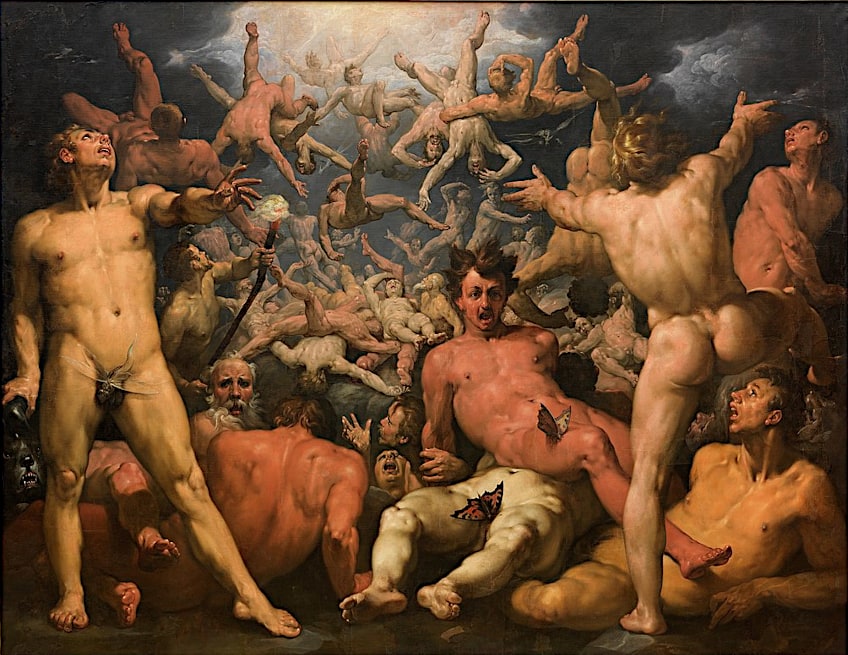 The Fall of the Titans by Cornelis van Haarlem (from 1588 to 1590); Cornelis van Haarlem, Public domain, via Wikimedia Commons
The Fall of the Titans by Cornelis van Haarlem (from 1588 to 1590); Cornelis van Haarlem, Public domain, via Wikimedia Commons
Cronus and the other fallen Titans were imprisoned in Tartarus, a deep void inside the Underworld, following the fight between the Titans and the Olympians. Tartarus was regarded as the lowest and most terrifying area of the Underworld, where the most evil and powerful creatures were imprisoned. They were sentenced to perpetual agony and captivity, with no access to the mortal or celestial realms.
In Hesiod’s poetry, Cronus was a good and righteous ruler of both humans and gods who lived in peace and harmony during the Golden Age.
While in the Orphic tradition, Cronus was liberated from Tartarus by Zeus in an act of reconciliation and given the dominion of Elysian Fields, a place for people selected by the gods, those who were righteous and valiant, where they would live a blissful and happy existence, indulging in whatever occupations they desired in life.
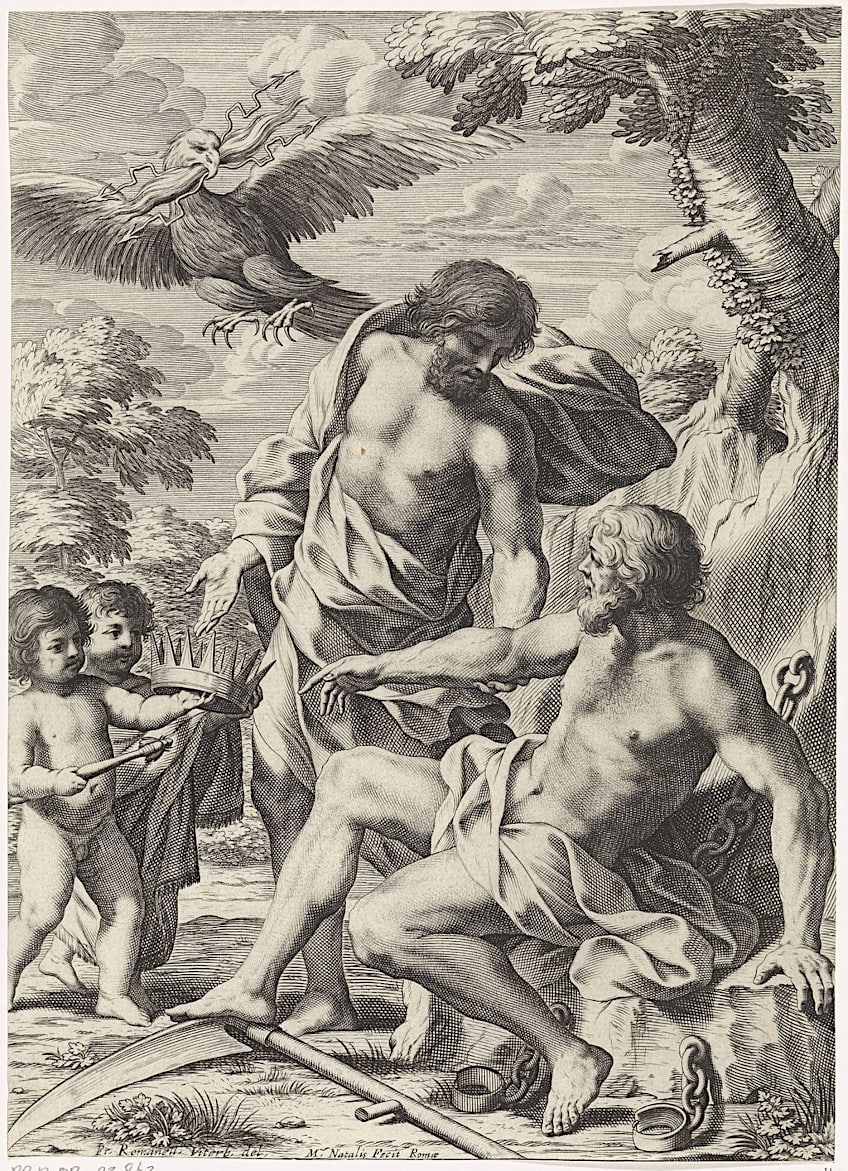 Jupiter (Zeus) and Saturnus (Cronus) by Michel Natalis showing the reconciliation of Zeus and Cronus after a painting by Giovanni Franceso Romanelli (1632-1633); Rijksmuseum, CC0, via Wikimedia Commons
Jupiter (Zeus) and Saturnus (Cronus) by Michel Natalis showing the reconciliation of Zeus and Cronus after a painting by Giovanni Franceso Romanelli (1632-1633); Rijksmuseum, CC0, via Wikimedia Commons
Cronus’ Personality and Attributes
Cronus is often characterized as having a complex personality that changes throughout his story. Cronus displayed immense cunning and ambition, as seen by his castration of his father Uranus in order to conquer control. This act exemplifies his drive to go to the top and demonstrate his authority over the universe. Cronus became driven by fear and paranoia of being toppled after taking power, much as he had deposed his own father. Cronus’ deeds of consuming his offspring demonstrate his ruthlessness and tyranny.
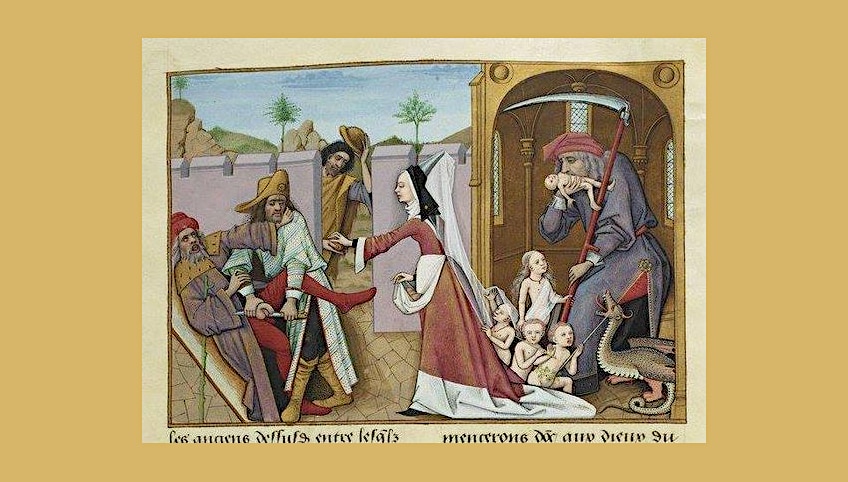 The Family of Gaia and Uranus by Evrart de Conty (c. 1401); Robinet Testard, Public domain, via Wikimedia Commons
The Family of Gaia and Uranus by Evrart de Conty (c. 1401); Robinet Testard, Public domain, via Wikimedia Commons
He reigned with an iron grip, putting down any prospective challenges to his dominion. This part of his personality reveals his determination to go to great measures to keep his power. Cronus’ inordinate pride, played a role in his demise. He underestimated his own children’s strength and dedication, notably Zeus, which resulted in his defeat in the Titanomachy. Within Greek mythology, Cronus represents generational conflicts.
As a result of his defeat by Zeus and the Olympian gods, he represents the notion of the old generation being ousted by the new generation. This particular aspect of his character defines his status as a mythological figure.
The Physical Traits of Cronus
Cronus is frequently depicted as a gigantic and towering figure. He is often represented as a Titan, bigger and more formidable than the subsequent Olympian gods. Cronus often appears as a senior god with a thick beard, which represents maturity and wisdom. His beard is typically long, illustrating his position as a strong and authoritative persona.
Cronus is portrayed as a royal and magnificent figure, but also paradoxically, as the epitome of savagery when he is devouring his children.
He is shown in ornate attire, robes, or armor, embellished with power and authority emblems. These graphic aspects emphasize his position as Titans’ king.
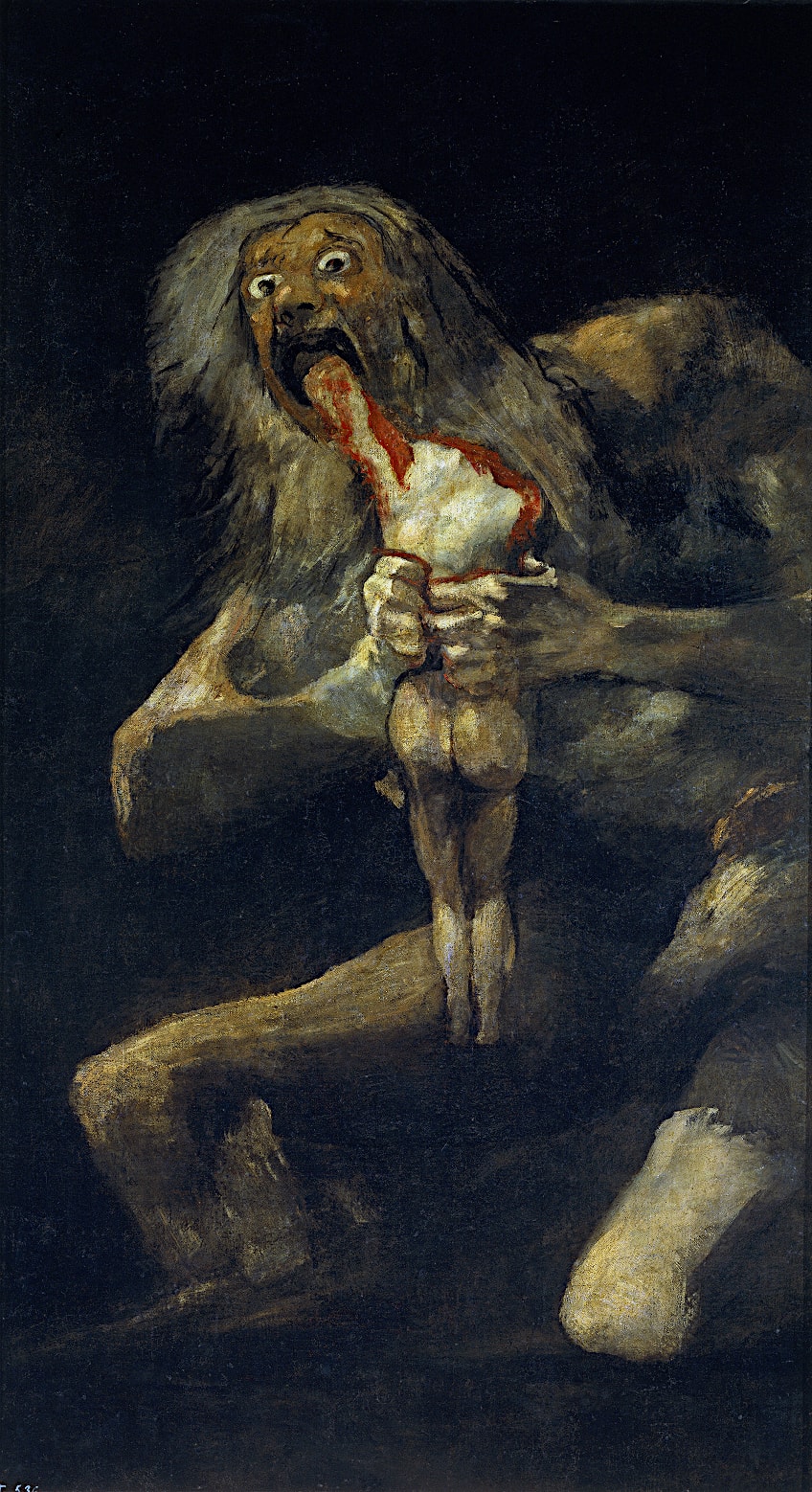 Saturn (Cronus) Devouring His Son (from the Black Paintings) by Francisco Goya (between 1820 and 1823); Francisco Goya, Public domain, via Wikimedia Commons
Saturn (Cronus) Devouring His Son (from the Black Paintings) by Francisco Goya (between 1820 and 1823); Francisco Goya, Public domain, via Wikimedia Commons
The Greek God Cronus’ Symbols
Because of its significance in Cronus’ mythical narrative, the sickle is often associated with him. He used it to castrate his Uranus, representing his position as a usurper and the downfall of the previous generation of gods.
Cronus is seen in some portrayals brandishing a scythe, a long curved blade connected to a handle.
This represents his connection to the harvests and the cyclic rhythms of time. In art, depictions of Cronus and the personification of time name as Chronos share the same attributes.
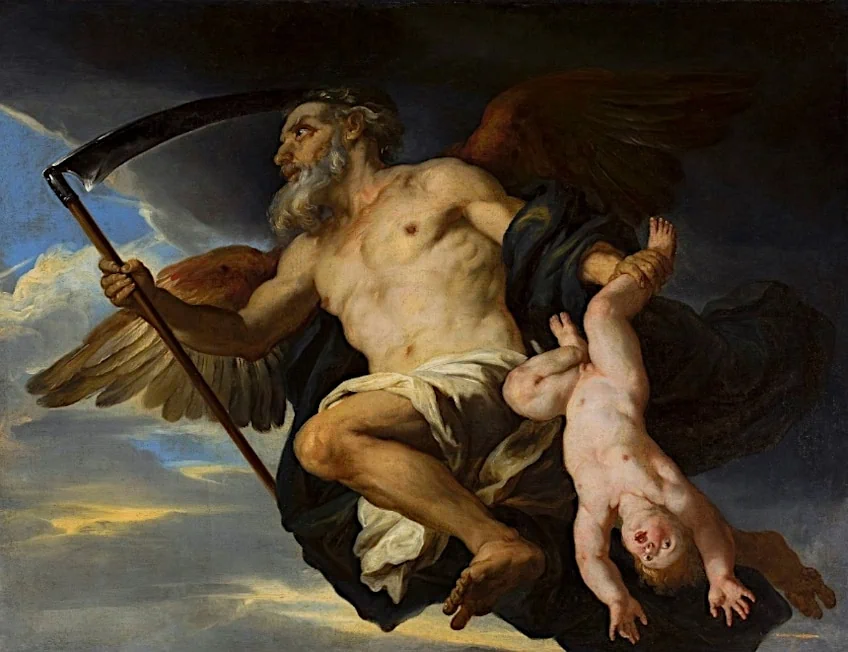 Chronos by Giovanni Franceso Romanelli (mid 17th Century); Giovanni Francesco Romanelli, Public domain, via Wikimedia Commons
Chronos by Giovanni Franceso Romanelli (mid 17th Century); Giovanni Francesco Romanelli, Public domain, via Wikimedia Commons
Cronus, as a ruler and a Titan related to time, could also be symbolized by timepieces such as sundials or hourglasses. Cronus is often associated with serpents, which symbolize his connection to primordial energies and his status as a Titan. Serpents can often be seen curled about his torso or linked in some way.
Domains of Influence
Cronus was linked to the notion of monarchy and rulership. As Titans’ ruler, he embodied the authority and strength that comes with leadership. He established a standard for future generations of mortals and deities who would assume positions of power.
Cronus was deeply connected to time, especially the notion of cyclic time and the succession of generations.
These associations were strengthened by the Roman identification of Cronus with their god Saturn, who presided over their midwinter festivals.
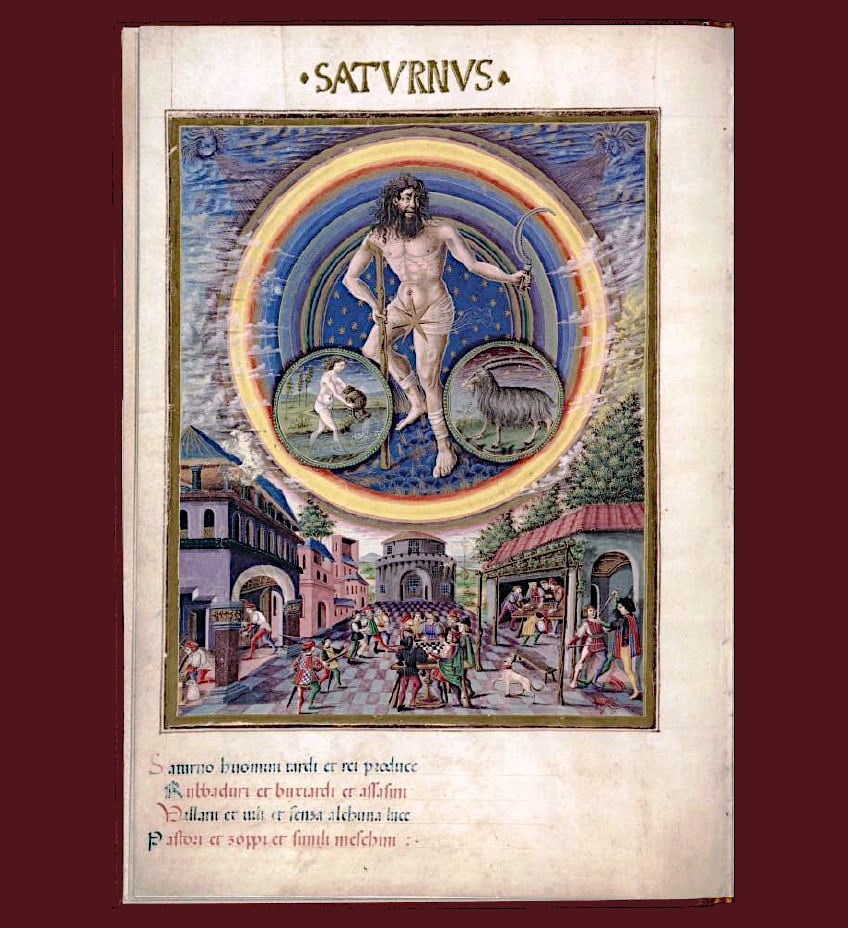 Saturn from De Sphaera formerly attributed to Cristofo de Predis (c. 1470); Formerly attributed to Cristoforo de Predis, Public domain, via Wikimedia Commons
Saturn from De Sphaera formerly attributed to Cristofo de Predis (c. 1470); Formerly attributed to Cristoforo de Predis, Public domain, via Wikimedia Commons
Cronus presided over the passage of time and the changes between different eras as the father of the gods and an old divinity. Cronus was associated with harvests in various interpretations. The sickle he used to castrate Uranus became connected with agriculture and agricultural harvesting. This link illustrates the cycles of life and the abundant harvests that come with the changing of the seasons.
The Mythology of Cronus
We already spoke about a few of the most significant myths involving Cronus above. These include how he overthrew Uranus and was subsequently overthrown by Zeus. However, these are not the only myths involving the Greek god Cronus. Below, we will explore a few more of his most notable myth stories.
Cronus and Typhon
Gaia, the Earth goddess, and mother of the Giants, grew outraged when Zeus and the Olympians vanquished the Giants in the Gigantomachy. Seeking vengeance on Zeus, she plotted against him by demeaning him in front of his wife, Hera. Her rage was fueled by Gaia’s remarks, and she sought the help of Cronus, her and Zeus’ father.
Cronus planned a scheme to assist Hera in removing Zeus in this rendition of the tale. He gave Hera two eggs coated with his own sperm and told her to plant them deep in the dirt.
Cronus anticipated that from these eggs would be born a monster capable of dethroning Zeus. When Zeus uncovered the plan and the birth of Typhon, he engaged the hideous creature in an epic clash. The battle between Typhon and Zeus was intense. Zeus eventually triumphed, defeating Typhon and imprisoning him beneath the volcanic Mount Etna in Sicily with thunderbolts.
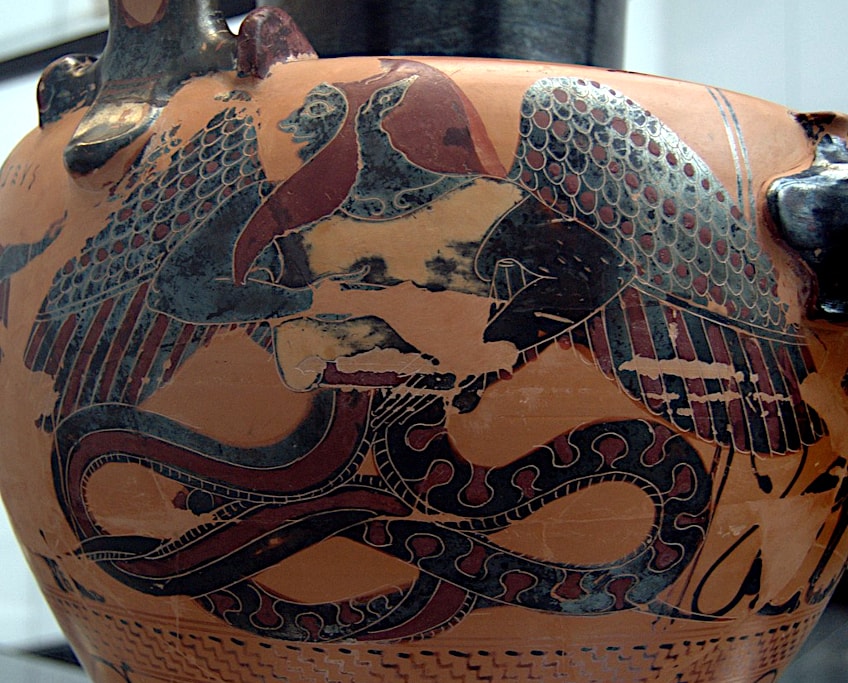 Chalcidian black-figure hydria with a depiction of Typhon (c. 550 BCE); Staatliche Antikensammlungen, Public domain, via Wikimedia Commons
Chalcidian black-figure hydria with a depiction of Typhon (c. 550 BCE); Staatliche Antikensammlungen, Public domain, via Wikimedia Commons
Cronus and Chiron
Cronus is said to have had a love relationship with Philyra, an Oceanid (a sort of water nymph). Their coupling culminated in the birth of a centaur boy named Chiron. Centaurs were legendary beings having a human upper body and the lower body of a horse. Philyra was frightened and disturbed by the appearance of her half-human, half-horse offspring. Based on some versions of the story, she was humiliated and reluctant to raise him. In some accounts, Cronus, fearful of his wife Rhea’s anger, requested Philyra to give up the youngster.
Philyra felt both sadness and sympathy for Chiron, and sought the assistance of the gods in order to protect and provide him with a better existence.
The gods responded to her petition by transforming her into a Linden tree and placing her in a sacred grove or woodland. Chiron, now orphaned, was abandoned to the care of other centaurs, as well as the deity Apollo and the nymph Chariclo. Chiron became famed for his remarkable wisdom, knowledge, and abilities, notably in music, medicine, and hunting, under their tutelage. Chiron’s knowledge and teachings were highly regarded, and he went on to become a well-known mentor and teacher to many heroes.
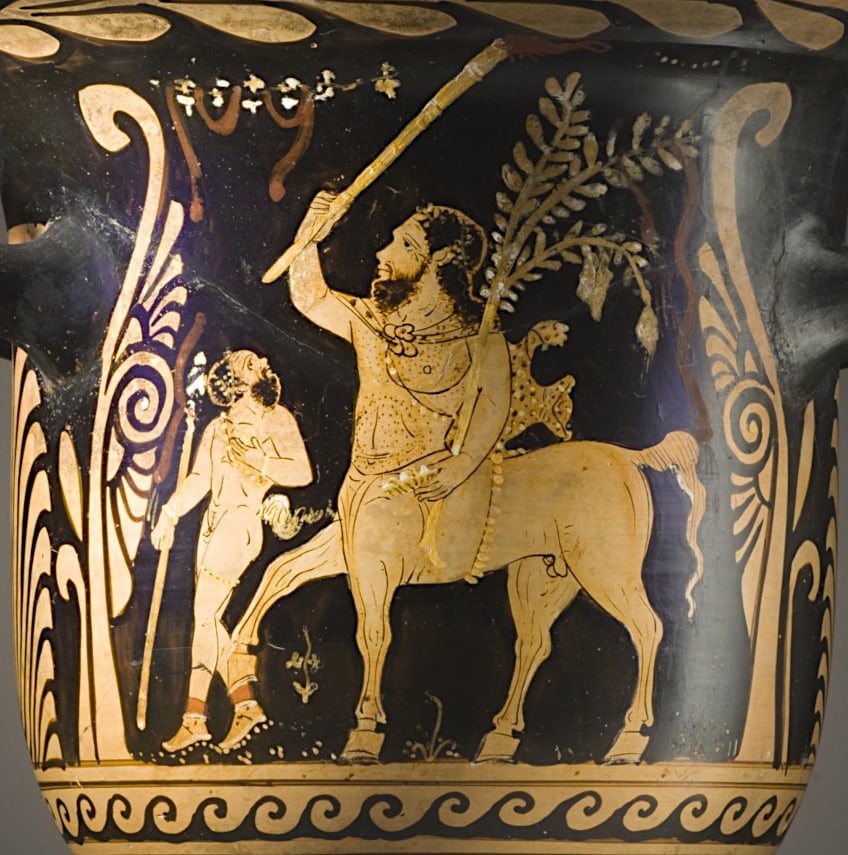 Paestan bell-Krater with a depiction of Chiron (c. 350-325); Los Angeles County Museum of Art, Public domain, via Wikimedia Commons
Paestan bell-Krater with a depiction of Chiron (c. 350-325); Los Angeles County Museum of Art, Public domain, via Wikimedia Commons
Cronus and the Corybantes
The Corybantes were divine or semi-divine entities who were usually portrayed as dancers or musicians. Their exact origin and genealogy vary across sources, however, Cronus is usually cited as their father. In some tales, the Corybantes were viewed as Zeus’s infant guardians or protectors. Rhea tried to hide Zeus after he was born, afraid that Cronus would consume him as he had done with his previous offspring.
The Corybantes would strike their spears and swords against their shields, making loud noises to drown out the baby Zeus’s cries, keeping Cronus from discovering his presence.
The Corybantes were connected to exuberant, chaotic, and frenetic dances, in addition to rhythmic music. They would partake in these lively and spirited acts, sometimes dressed in armor or unusual clothes. Their dances and music were thought to have cleansing and protecting properties.
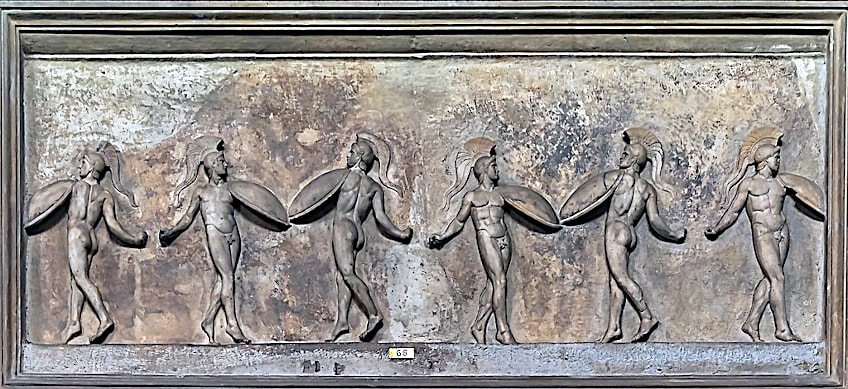 Relief with dancing warriors or Corybantes (1st Century BCE copy of a 4th Century original); Rabax63, CC BY-SA 4.0, via Wikimedia Commons
Relief with dancing warriors or Corybantes (1st Century BCE copy of a 4th Century original); Rabax63, CC BY-SA 4.0, via Wikimedia Commons
Cronus and Ammon
Diodorus Siculus, the Greek historian, related a Libyan myth about Cronus. According to the story, Titaea and Ouranos were the Titans’ parents, and Rhea was married to the King of Libya, Ammon. Rhea, though, deserted Ammon, instead marrying her younger brother Cronus, who went to battle with the King and the other Titans.
Cronus became King of Libya, yet he reigned brutally over his citizens.
He was eventually destroyed by Ammon’s son Dionysus, who made Rhea and Cronus’ son Zeus ruler of Egypt. Later, Zeus and Dionysus joined forces to destroy the last Titans in Crete, and upon Dionysus’ death, Zeus acquired all the kingdoms, establishing himself as the supreme Lord of the World.
Roman Mythology
While the Greeks saw Cronus as an unkind and tempestuous force of disorder and chaos, claiming that the Olympian gods brought about an era of stability by taking power from the malicious and crude Titans, the Romans saw Cronus as a more benevolent and benign deity, combining their deity Saturn with Cronus. As a result, although the Greeks saw Cronus as only a mediator between Zeus and Uranus, he was an important part of Roman religion. The Saturnalia was a celebration in his honor, and there was a famous temple to Saturn in the ancient Roman Forum.
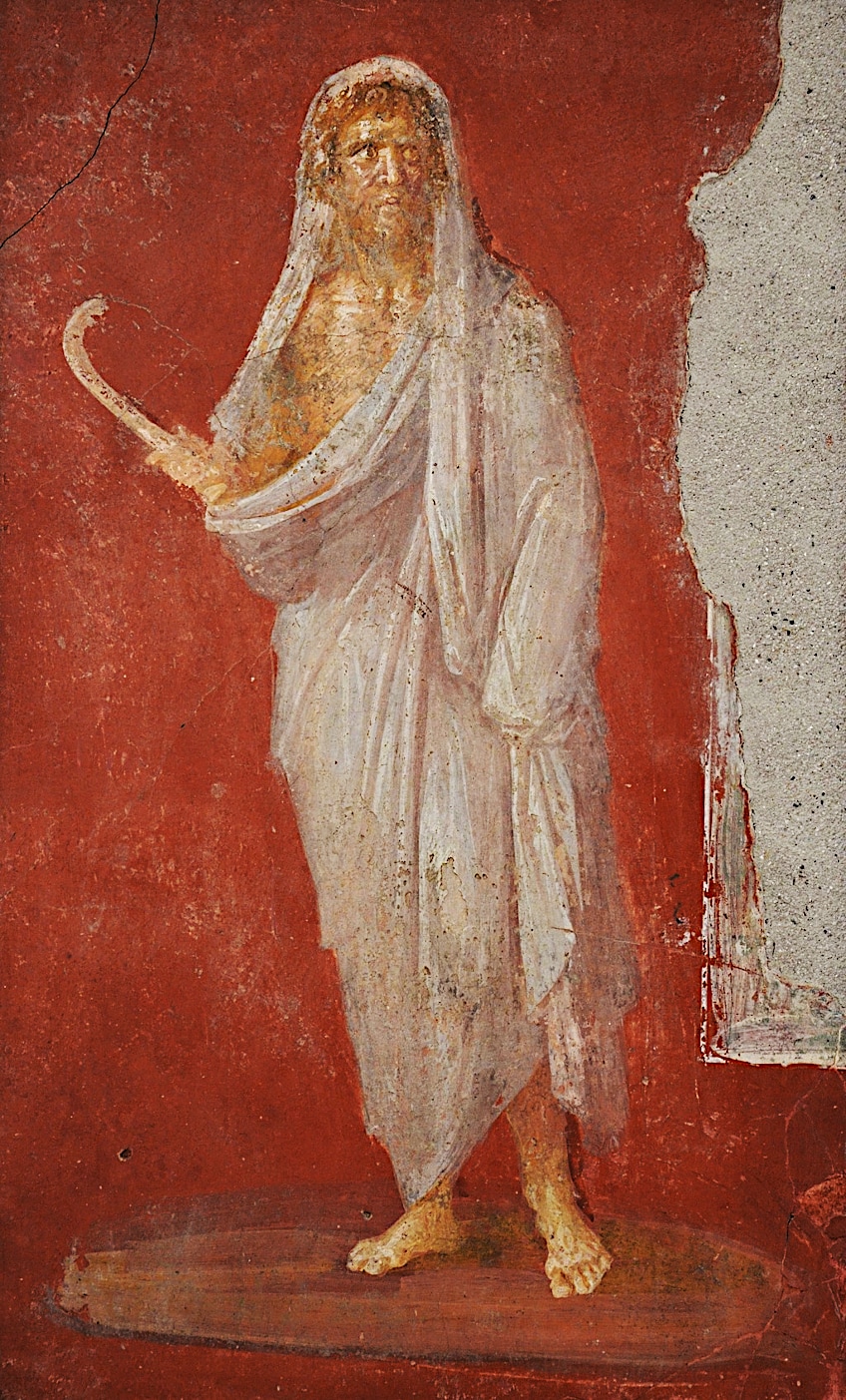 Roman fresco from Pompeii depicting Saturn wearing a winter cloak and holding a scythe; Carole Raddato from FRANKFURT, Germany, CC BY-SA 2.0, via Wikimedia Commons
Roman fresco from Pompeii depicting Saturn wearing a winter cloak and holding a scythe; Carole Raddato from FRANKFURT, Germany, CC BY-SA 2.0, via Wikimedia Commons
Because of his relationship with the “Saturnian” Golden Age, he eventually became the god of time, i.e., seasons, calendars, and harvests – not to be confused with Chronos, the unconnected incarnation of time in general. Nonetheless, among Hellenistic intellectuals in Alexandria and during the Renaissance, Cronus was confused with Chronos, the “Father Time” brandishing a harvesting scythe. Because of Cronus’ significance to the Romans, his Roman counterpart, Saturn, has had a significant impact on Western civilization.
The seventh day of the Judaeo-Christian week is known in Latin as Dies Saturni (“Day of Saturn”), from whence the English name Saturday was derived. Saturn, the planet in astronomy, was given its name after the Roman god.
Greco-Roman Egypt Mythology
Cronus was identified with the Egyptian deity Geb in Greco-Roman Egypt because he played a similar role in Egyptian mythology as the father of the deities Isis, Osiris, Seth, and Nephthys as Cronus had played in the Greek pantheon. This equation is especially well documented in Tebtunis, in southern Fayyum: Cronus and Geb were members of a local form of Sobek’s, the crocodile god’s, worship.
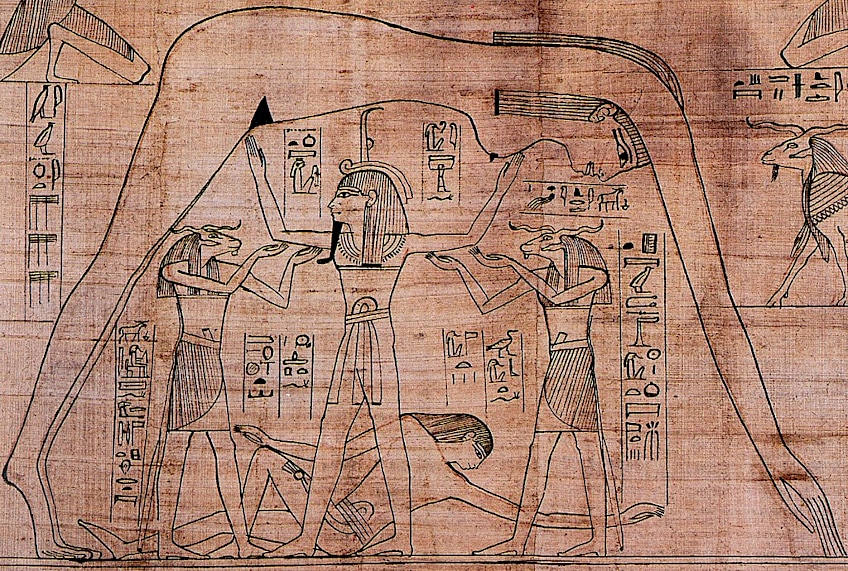 Geb reclining beneath Nut supported by Shu and the ram-headed Heh deities from the Greenfield Papyrus (c. 950 BCE); Photographed by the British Museum; original artist unknown, Public domain, via Wikimedia Commons
Geb reclining beneath Nut supported by Shu and the ram-headed Heh deities from the Greenfield Papyrus (c. 950 BCE); Photographed by the British Museum; original artist unknown, Public domain, via Wikimedia Commons
The equation was portrayed in local deity imagery, in which Geb appeared as a man with Cronus’s qualities and Cronus with Geb’s attributes. Egyptian names derived from the deity Geb were equally common among local villagers as Greek names derived from the Greek god Cronus.
The Influence of Cronus After the Greco-Roman Era
With the emergence of Christianity, the ancient Greek and Roman divinities, including Cronus, were often viewed as heathen deities from another age. Cronus was occasionally connected with the biblical figure of Saturn in Christian texts, and negative associations related to pagan gods were attributed to him. As a result, he often appeared as a figure of idolatry and immorality.
The connection between Cronus and time became more significant in subsequent ages. He was viewed as a symbol of aging, the passing of time, and the unavoidable loss of worldly power.
This perspective can be observed in literary and artistic works, wherein Cronus is shown as an older person, typically holding a scythe or hourglass, signifying the ephemeral nature of human existence. Cronus’ mythical saga has been seen as an analogy for autocratic rulers and harsh governments, with elements of dominance, usurpation, and oppression. He serves as a cautionary tale, illustrating the risks of unrestrained power and the vicious cycle of violence and terror that it can produce. Cronus is sometimes connected with repressive rulers in political and historical discourse in this context.
Lessons of Cronus’ Mythology
The myth of Cronus exemplifies the cycles of power and the inevitable process of succession. He deposes his father, Uranus, only to be deposed by his own son, Zeus. This cycle implies that power is fleeting and that no king can govern eternally. It acts as a reminder to use power wisely and with an awareness of its transience. Cronus’ deeds, especially his eating of his own offspring, are the result of hubris, or inordinate pride. His dread of being toppled from his position pushes him to perform these deeds, which eventually lead to his own demise.
 Goya’s depiction of Cronus devouring his children used as a symbol of climate denial on a poster at the People’s Climate March 2017; dw_ross from Springfield, VA, USA, CC BY 2.0, via Wikimedia Commons
Goya’s depiction of Cronus devouring his children used as a symbol of climate denial on a poster at the People’s Climate March 2017; dw_ross from Springfield, VA, USA, CC BY 2.0, via Wikimedia Commons
Zeus’s destruction of Cronus represents the triumph of justice over oppression. Cronus’ rule was distinguished by his unfair deeds and fear-based judgments. Zeus, on the other hand, represents a new order that values fairness and the equal allocation of authority.
The Succession Myth emphasizes the necessity of justice in social systems, as well as why it is necessary for rulers to lead fairly and with integrity.
The association of Cronus with time and aging acts as a reminder of the passing of time and the inescapable aging process. It promotes contemplation on the fleeting nature of human existence and the need of making the most of the time we have. It inspires us to enjoy this present moment and think about how we might leave a great legacy for future generations.
Cronus, also known as Kronos in Greek mythology, was the youngest of the Titans, born of Uranus and Gaia. Cronus was regarded as the primordial and ancient God of time, a destructive and consuming force of nature. Cronus, according to Hesiod’s Theogony, he alone obeyed his mother’s pleas to overthrow his tyrannical father Uranus, the king of the cosmos. Cronus staged a revolution against his father, becoming King of the Titans, and taking his sister Rhea as his queen and wife. Unfortunately, Cronus’ habit of devouring his children led his own demise at the hands of his son Zeus who then established the Olympian order.
Frequently Asked Questions
What Is Cronus the God Of?
Cronus is known as the god of time and harvests. Cronus’ link to time derives from the era known as the Golden Age, which was defined by abundance, harmony, and peace. This era was seen to be a time of prosperity, representing the recurring seasons of the agricultural year. Furthermore, Cronus’ function as the deity of agriculture is intertwined with his relationship with time. He was thought to oversee agricultural cycles, assuring optimum crop development and harvest success. This feature of Cronus’ realm emphasizes his role in supporting life and upholding the world’s natural order. Sometimes he is confused for the embodiment of time, Chronos, and even shares many of the same attributes.
Who Is Cronus’ Father?
Cronus’ father in Greek mythology is Uranus, the deity of the sky. Uranus was one of the earliest gods to arise from the primordial condition of existence, Chaos. He rose to become the cosmos’ king, covering the skies as a representation of the sky itself. Uranus played an important part in the gods’ ancestry. He married Gaia, the embodiment of the Earth, and together they gave birth to a slew of mighty creatures. However, Uranus’ relationship with his Titan children grew rocky. Fearing the strength of the Cyclopes and Hecatoncheires, he imprisoned them in Tartarus, the darkest section of the Underworld. Cronus and the other Titans rebelled against Uranus as a result of this conduct, which ended in Cronus castrating Uranus and claiming power for himself. Cronus’s mother in Greek mythology was the embodiment of the Earth itself, Gaia.
Why Did Cronus Eat His Children?
As a defeated Uranus ascended to the sky, he predicted the Titans’ fall and the penalties they would face for their misdeeds. Cronus was therefore cursed to suffer the same destiny: being deposed and rejected by his own descendants. Cronus became uneasy over his father’s remarks since he was going to become a parent. To avert the fulfillment of the prophecy, Cronus devoured each of his offspring as they were born: Demeter, Hestia, Hera, Hades, and Poseidon.

I am deeply passionate about history and am constantly fascinated by the rich and complex stories of the past. As the editor-in-chief of learning-history.com, I have the opportunity to share this passion with a wide audience through the creation and distribution of engaging and informative content about historical events, persons, and cultures. Whether it’s through writing articles and blog posts or creating videos or podcasts, I strive to bring the past to life in a way that is both accurate and enjoyable. My expertise in history, combined with my strong writing and communication skills, allows me to effectively communicate complex historical concepts and make them accessible and interesting to a wide range of readers. I am truly grateful for the opportunity to share my love of history with others through my work on learning-history.com.

